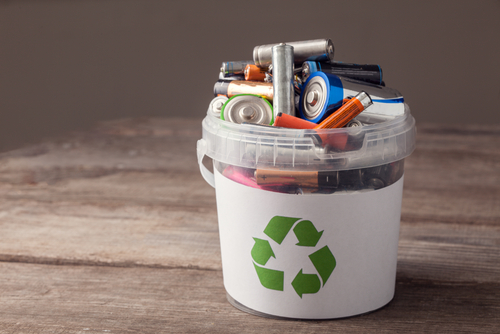If you do not dispose of lithium batteries safely, it can lead to fire. A recent National Fire Chiefs Council report revealed that the UK experienced over 1,200 battery fires in bin lorries and waste sites across the UK over the course of a year.
In this post we will outline the risks of improper lithium battery disposal. We will then discuss how you can help prevent fires in the home, workplace, or beyond through proper battery storage and disposal.
If you want to understand and manage the specific risks you face in your business, we can advise you on your risk management and insurance needs. Contact us on 020 8290 9080 or email business@anthonyjones.com.
The Fire Risk of Lithium Batteries
Lithium-ion batteries are high capacity, they’re relatively lightweight, and they’re rechargeable. It’s for these reasons that we use them to charge many of the items we use every day, including our smartphones, tablets, laptops, e-bikes, e-scooters, and other electric vehicles.
Yet as well as offering a range of benefits, lithium batteries also carry a strong risk of fire.
If you do not properly store or dispose of your lithium batteries, it can lead to a chemical reaction known as a thermal runaway. This means that the battery can rapidly overheat and catch fire. And when a lithium battery catches fire, it can burn at temperatures of around 1,000°C. It can also emit toxic and flammable gases, which can lead to an explosion.
Learn more about the fire risks of lithium batteries, and how to manage them.
Why Can’t We Throw Lithium Batteries in the Bin?
If a lithium battery gets crushed, pierced, or otherwise damaged, it can greatly increase the risk of thermal runaway. This is why it’s a bad idea to dispose of lithium batteries in the standard waste stream, where they could get crushed, compressed, and exposed to extreme heat and pressure.
Disposing of Lithium Batteries to Reduce Fire Risk
Safe lithium battery disposal involves carefully managing every step of the process so as to ensure the batteries are never treated in such a way that would increase the risk of fire. This includes safely storing the batteries prior to their disposal.
Please note that all batteries carry a fire risk when they’re compromised. Though the risk is particularly severe with lithium batteries, you should also take care when storing and disposing of alkaline batteries.
When Should You Dispose of a Lithium Battery?
If the lithium battery is in any way damaged or degraded, or if it’s just getting old, then you should stop using it immediately.
Here are some signs that it’s time to dispose of a lithium battery:
- The battery takes ages to charge, but it doesn’t provide charge for as long as it used to. This may mean that the battery is too old and degraded to use any longer.
- The battery gets excessively hot when charging, or when in use.
- The battery looks scuffed, scratched, or there are signs of bulging.
How to Properly Store and Dispose of Lithium Batteries
- If possible, remove the battery from the device prior to disposal. This will help the waste management services identify what type of battery they’re working with.
- As we’ve seen, you should not dispose of batteries in the main waste stream, or the mixed recycling bin. Instead, get a dedicated box or bin to use solely for old batteries.
- Get a free Battery Collection Box from Recycle-More, who can also collect the box for proper disposal once it’s full. On top of this, Recycle-More can provide various information posters for the workplace, to help your staff understand the risks of battery fires.
- Store your batteries somewhere cool and dry, out of direct sunlight, and ideally away from any flammable substances or materials.
Should You Keep Lithium Batteries in the Fridge?
Some people think you can prevent battery fires through storing them in the fridge. This is a bad idea, as any extreme temperature, hot or cold, can ultimately lead to the thermal runaway reaction.
You Have A Duty of Care to Dispose of Batteries Safely
The Health and Safety Executive Waste Electricity and Electronic Equipment guidelines highlight the importance of safe battery disposal. Your business might have a legal obligation to comply with certain UK waste battery regulations. Fail to comply with these measures, and you could be held liable for all damages should improper battery disposal lead to a fire.
At Anthony Jones, we can help you understand and manage the specific fire risks you face in your business. Our friendly team of experts can advise you on your risk management and insurance needs, to help you get the cover you need for your business. For more information, contact us on 020 8290 9080 or email business@anthonyjones.com.


